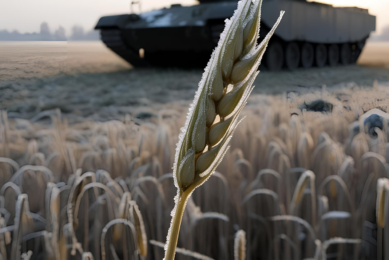Russian top official wants to use grain as a weapon

The former Russian president and senior security official Dmitry Medvedev threatened to restrict grain exports only to “friendly” countries of Russia, suggesting that the country should use grain exports “as a silent weapon.”
In a statement shared on his Telegram channel on April 1, Medvedev claimed that grain export is a “silent, but powerful weapon, as food security in several countries depends on the Russian grain suppliers”.
We will only be supplying food and agriculture products to our friends.
“Our agricultural export exceeds export of real arms. Last year it totalled $37 billion,” Medvedev said.
“We will only be supplying food and agriculture products to our friends,” Medvedev said. “Fortunately, we have plenty of them, and they are not in Europe or North America at all.”
The agriculture supplies to “friends” will be both in roubles and their national currency in agreed proportion, Medvedev said.
Medvedev went on saying that Russia won’t buy anything from its “enemies,” adding that the food embargo imposed in 2014, if necessary could be expanded.
Payments in roubles
On March 30, Vyacheslav Volodin, a member of the Russian parliament, also called that all of Russia’s export commodities, including grain, should be priced in roubles instead of the US dollar or euro.
“It would be right to expand the list of goods to be exported for roubles where it’s beneficial for our country: fertilisers, grain, vegetable oil, crude oil, coal, metals, timber, etc.,” Volodin said.
The Russian Union of Grain Exporters has already asked the Central Bank to work out the possibility for foreign buyers of Russian grain to make settlements in roubles under export contracts.
The grain exporters have asked to provide rouble liquidity for foreign banks that serve grain buyers, the largest of which are Turkey, Egypt, Iran, and Saudi Arabia.
Before the Russian invasion of Ukraine, almost all contracts were signed in dollars and euros, but in recent weeks Russian exporters experience difficulties as foreign banks often refuse to transfer money in these currencies to Russia, the Russian newspaper Kommersant reported, citing grain exporters.
Eduard, Zernin, chairman of the Russian Union of Grain Exporters, explained that the appeal to the Central Bank is associated with the fact that when it comes to deliveries to foreign customers, Russian companies experience severe problems with logistics, and insurance, and payments.
The exchange rate is a problem
However, Dmitry Rylko, general director of the Russian Institute for Agricultural Market Studies, said that though payments in roubles theoretically can be considered for Turkey, which has large volumes of mutual food trade with Russia, it is hardly possible with other importers.
To some extent, it is believed that exporters are reluctant to conclude payment in roubles because of the Russian currency’s exchange rate fluctuations. In the first weeks since the beginning of the war in Ukraine, the Russian rouble plummeted by 40%.
The exchange rate has bounced back thanks to extraordinary measures taken by the Central Bank, including the prohibition of selling dollars and euros to the population. However, the prospects remain largely gloomy as the country is now heading into the worst economic crisis since 1991.











